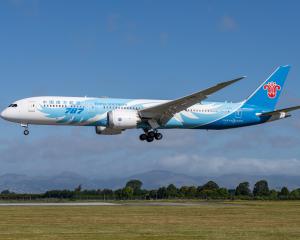Recently, I have received a lot of Chinese entrepreneurs who have come to inspect the South Island, and I have also exchanged views on Chinese investment with the local economic and trade circles.
In my opinion, although there was the case of Shanghai Pengxin Group's acquisition being rejected, the prospect of Chinese enterprises investing in New Zealand is still very bright.
First, the overall development of economic and trade relations between China and New Zealand has determined the importance of mutual investment, and will further enhance it.
Before signing the FTA, China and New Zealand already had considerable foundations for bilateral investment development.
The FTA has provided policy guarantee, avoided many risks and made the investment environment more favourable.
However, compared to the significant role the FTA has been playing in the bilateral trade in goods, its role in promoting mutual investment is relatively not so strong.
Although in recent years it has attracted the attention of many, China and New Zealand are yet to be each other's most important investment partners.
Evidently, China and New Zealand's bilateral investment still has huge potential.
With the continuous negotiations to upgrade the FTA, the emphasis on bilateral investment will significantly increase.
Second, New Zealand does need to attract foreign investment.
There is still a huge gap in terms of funding for Christchurch rebuild and future developments.
The city council had to sell a number of its strategic assets to make up for it, for example City Care.
Just recently, the city council's contribution of $2million to a new adventure park at Port Hills has been matched by NewUrban Group through its partnership with a Beijing-based development and construction Huadu International Group.
In the Otago region, Silver Fern Farms has struggled with debt in recent years.
Under its deal with Shanghai Maling, it will not only have the strongest balance sheet of any red meat company in New Zealand, with zero debt, but also have the money it needs to invest in updating its plants nationwide and increasing its value-add strategy.
In fact, the problem faced by the whole dairy industry is to bring more added value into the products and to make the whole production more competitive and cost-saving, which is vital and can be very costly.
Third, China's overseas investment will continue to accelerate irreversibly.
Recently, China's international economic environment has undergone major changes, the global economy has entered a deceleration phase, international trade and investment are also slowing down, and it has become difficult for China's economy to continue to rely on foreign trade as an engine of growth.
Following the past 35 years of reform and opening up, China's economy is now in its most significant change towards.
The "bringing-in'' model characterised with inwards investment, commodity output and process division of labour is gradually being replaced by "going-out'' model with export of capital and independent production.
According to the figures released by China's Ministry of Commerce, from January to November last year, China's direct foreign investment accumulated up to $US88billion, an increase of 21.2%.
China's sufficient overseas investment has become a significant driving force for China's economy and the world economy.
At the same time, Chinese enterprises investing overseas have shown more mature performances.
Due to lower international milk prices, many New Zealand dairy producers have significantly reduced the purchase price of milk, sending dairy farmers into the deep end.
However, the Yili Oceania Dairy in Waimate used "insured reserve price'' on the basis of higher costs to purchase milk.
This ensured dairy farmers' continuous operation and also stabilised a foundation for milk collection in coming years.
Its responsible attitude received wide praise.
Fourth, as new bilateral or regional free-trade agreements are rolled out, investment facilitation will accelerate at an unstoppable pace.
In fact, since China joined the World Trade Organisation, although there are many free-trade agreements, but in the world trading system nothing significant has come out of negotiations, until recently the agreement of the TPP.
It is noteworthy that the TPP has stimulated and will further stimulate more free-trade agreements and I very much agree with Crawford Falconer on this point.
The free-trade agreement between China-Republic of Korea, China-Australia have been signed and approved, negotiations for China-Asean FTA upgrade is complete, and China-South Korea-Japan FTA negotiations are soon to restart.
Meanwhile, preparations have stepped up for negotiations over the upgrade of China and New Zealand's FTA, New Zealand has begun FTA negotiations with the European Union, RCEP negotiations have made significant progress and parties are determined to complete negotiations in 2016.
Investment facilitation will be an important part of the FTA.
Fifth, TPP itself will have associated effects on Chinese investments in New Zealand.
Some provisions in the TPP investment chapter would flow through to New Zealand's bilateral FTAs with China, China's Taiwan and the Republic of Korea, in which there are "most favoured nation'' provisions.
These included the screening of overseas investment in New Zealand.
The current threshold of overseas investment in New Zealand will be doubled to $200million.
Meanwhile, the non-discrimination provisions would prevent the Government banning TPP nationals from buying property in New Zealand, although it would retain the ability to impose some types of new, discriminatory taxes on property.
In philosophy, the relationship between subjective initiative and objective reality is very subtle.
Sometimes human beings can change the world. Man, by his efforts, can conquer nature.
However, sometimes we simply could do nothing to change or even to slow it, especially the momentum of history.
Global economic integration is a world trend.
Capital knows no borders, and its nature is profit-driven, some will come and some will go.
Complying with the law is the rule of the market and the capital flow.
As long as it is within the framework of the rule of law, capital should enjoy the freedom of movement.












